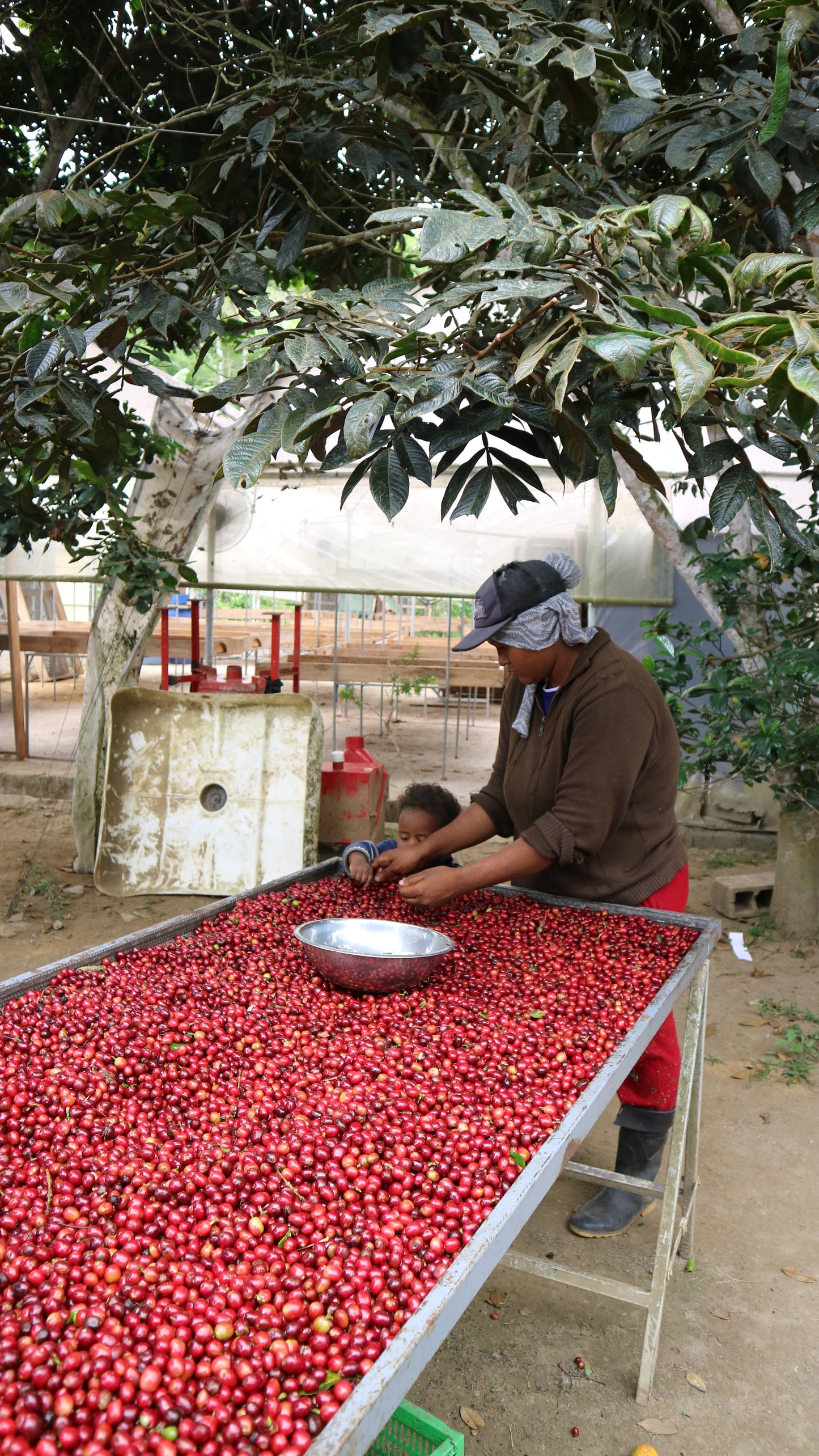![Ecuador - Mario Hervas' Honey [25/26]](http://scenery.coffee/cdn/shop/files/ecuador_mario_hervas_honey_shopify.png?v=1762292024&width=1445)

![Ecuador - Mario Hervas' Honey [25/26]](http://scenery.coffee/cdn/shop/files/WhatsApp_Image_2025-09-26_at_12.37.22.jpg?v=1762292024&width=1445)
![Ecuador - Mario Hervas' Honey [25/26]](http://scenery.coffee/cdn/shop/files/WhatsApp_Image_2025-09-26_at_12.22.26.jpg?v=1762292024&width=1445)





Brew Guide:
Best Brewed with: Filter/Espresso
Lightest Roaster Influence: We're playing around with slightly less aggressive heat application for Ecuadorian coffees, aiming to still get the notable expansion and solubility we aim for, but preserving maximum aromatics. At the lightest roast degree, we're finding intense florals and sweetness!
Best Rested: 4 weeks+
Filter: 60g/L, 96°C when fresh but when well rested you can go down to 92-93°C
Espresso: 18g/48g/20-22s. Brilliant turbo/soup.
We’re tasting: Intense honeysuckle florals lead the aroma alongside ripe peach. In the cup it's sugary sweet - like white sugar, reminding us almost of a glazed donut. There's a juicy fresh acidity - we get flat peach, apricot and clementine. The finish is long, lingering, with some blackcurrant fruit pastilles and more florals, much akin to milky lady grey tea.
Traceability
Country of Origin: |
Ecuador |
Region: |
Nanegal, Pichincha |
Producer: |
Mario Jose Hervas |
Farm: |
Finca El Meridiano |
Variety: |
Mejorado |
Elevation: |
1350-1500 MASL |
Process: |
Honey: Hand picked, floated and re-sorted at the collection point, held in cherry in water for 48 hours ferment before pulping. Parchment dry fermented for 48 hours (in Mario's new stainless steel tanks), before draining excess mosto. Dried on raised beds inside parabolic driers with mucilage on, over 20 days.
|
Import Partner: |
Makicuna |
Harvest |
Crop 25/26, Harvested June, arrived UK September 18th 2025 Third harvest purchasing coffee from Mario |
The Story
Mario knows exactly what he wants to produce - his focus for the last 14 years has been on the selective breeding and phenotypic expression of the varieties he grows on his farm, first perfecting his Mejorado plants and now working on Rosado & Gesha. He produces exceptionally clean & sweet coffees that present the cultivar expression front and centre - always the focus has been on being able to taste the cultivar, taste the environment in which it was grown. Last year was tricky weather - and while his washed lot had all the florals and citrus we expect from Mario's Mejorado, it was reflective of the season's conditions with slightly less structure and intensity than the 23/24 crop.
But Mario has been working on a honey process for the last few years - something that combines the clean expression of his washed coffees, but with a dry in-mucilage fermentation stage to add but a hint of the character you can achieve with processing like this. But Mario isn't a fan of exporting these coffees via sea - he thinks after 6 months, more of the "in-cherry" reposado flavours become more prominent, and that's not the sort of coffee he wants to produce (even though to us, we'd almost certainly find them delicious).
We became aware that Makicuna planned to air-freight a pallet of competition coffees (like Pepe Jijon's Finca Soledad) in August/September of this year - so we got in touch with Mario. We said - if we can get it fast, so it's still clean, can you make us a honey?
We were asking for something - asking Mario to take a risk, to make a custom lot, and he agreed. We're very, very firm believers that if you do something like that, you have a responsibility as a buyer to take that risk back on yourself. Mario set his price, we asked for no samples, we had no specific volume request, we set no conditions on which we could reject the coffee - if it wasn't good, we'd have figured out an alternative use for it and eaten the loss. But we knew we could trust Mario to absolutely smash it
When the 2 x 40kg boxes (the day lot Mario produced was about 66kg of parchment before the milling + QC sorting loss) arrived, we eagerly cracked open a vac-pac to sample roast. Safe to say this is one of the best coffee's we've ever had from Mario and it is an absolute stunner.
El Meridano:
Thanks to his previous career as a rose farmer and agronomist, Mario has turned his experience towards obsessive improvement of Finca El Meridiano since starting the farm in 2011.
The 25 HA Finca El Meridiano sits in the stunningly biodiverse and thriving cloud forests of Nanegal, in the foothills of the Andean mountains. The climatic conditions around Pichincha means farms receive high rainfall and a relatively high humidity, which can make for a tough environment for certain varieties and cultivars of coffees more adapted to drier climes.
Mario tells us the first six to seven years of running the farm were tough and that he made many mistakes in the process of learning about the art of growing, processing and selling coffee, but he stuck at it - and while each year brings new challenges and learning, it’s started to pay off - like taking 10th place in the inaugural Ecuador Cup of Excellence, for a start.
One of the things Mario credits for his success is his nursery and breeding program. The “Mejorado” cultivar has its history in a Nestle variety garden, and is a cross between Bourbon and an Ethiopian landrace (likely for the purposes of hybrid vigour, improved yield and quality). This variety is gaining a strong reputation for quality - deep sweetness, florality and complexity when grown well.
Mario has germinated, selected and bred every single tree on the farm. By selecting only those Mejorado trees that performed well in Meridiano, the 10 HA that are planted with coffee are strong, healthy, high yielding and of impeccable quality. The coffee from Meridiano is incredibly consistent - and considering the impacts of climate change and general natural variability, it’s no mean feat.
Scoffing at the thought of natural processing, anoxics, co-ferments and the like, Mario has been tweaking his washed process (and more recently white/yellow honey process) to bring out the cleanest expression of the land and cultivar. One aspect he credits for the quality of the fermentation is the quality of the private springs that provide the farm water.
Mario’s coffee comes with a price - that we think is more than fair to pay. Ecuador is a dollarized economy, which broadly means their internal goods and services (including labour) are more expensive when compared to neighbouring countries. One of the biggest challenges in running a speciality farm in Ecuador is the labour to pick the cherries. Seasonal itinerant labour is reduced in Ecuador, as many who would undertake it have migrated north in search of economic empowerment. While Mario pays more for quality, it can be hard to retain pickers - to the point it is almost better to pay someone who picks poorly (and re-sort the cherries at the collection point), than to force the issue and have them not turn up the next day.
There are never enough pickers to get all the cherries on the farm - so Mario’s focus to ensure his farm is profitable is on adding value through quality, rather than bulk quantity.
Having worked on the Mejorado project for some time, Mario is turning his attention to Rosado and Gesha - although he says there is some work to be done yet to select for the genetic expression he is looking for. We’re very excited to see what he cooks up - we’ll try and be first in line for the early harvests, that’s for sure.
- Choosing a selection results in a full page refresh.
- Opens in a new window.









